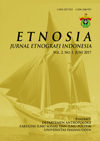Abstract
The existence of online mode of transportation has attracted consumers’ attention, and therefore many switch from the use of conventional to online mode of transportation. The switch has become a trigger of conflict between drivers of conventional transportation, such as city transportation (angkot), taxi, motorbike (bentor), rickshaw (ojek pangkalan), and drivers of online transportation, such as Grab and Go-Jek. This artikel is focused on the existence and the conflict between these two mode of transportations in Kota Makassar. It was found that online transportation has become an alternative of transportation for society for a number of reasons: practicality, transparency, trustworthiness, security, insurance, features, discount and promotion rates, as well as new employment/part-time opportunities. The existence of online-based transportation has caused a conflict between the two. In one side, online transportation is considered to facilitate drivers and their passangers. On the other side, online transportation got criticised from drivers of conventional transportation due to the fact that the latter is being marginalised by the former. Conflict between the two is commonly base on operating lisence, colour of vehicle plate that significantly impacted on payment of taxes, passangers’ recruitment base, and competitive online transportation rates. The rate has becomeone of the advantages of online transportation as well as one of the source of conflicts between conventional and online transportation.References
Aji Iswanto, Yuska Apitya.2017. Mengurai Konflik Tarif Dasar Transportasi Online dan Konvensional di Bogor. http://www.bogor-today.com/mengurai-konflik-tarif-dasar-transportasi-online-dan-konvensional-di-bogor/#, diakses tanggal 2 Oktober 2017.
Avinda, Sevilla Permata. 2016. Analisis dampak ojek online terhadap pangkalan ojek konvensional Griya Pasteur.https://sevindanda.wordpress.com/2016/01/21/analisis-dampak-ojek-online-terhadap-pangkalan-ojek-konvensional-griya-pasteur/, diakses tanggal 10 Agustus 2017.
Dahrendorf, Ralf.2011.Teori Konflik. http://perilakuorganisasi.com/ralf-dahrendorf-teori-konflik.html, diakses tanggal 7 September 2017.
Dephub. 2016. Permenhub 32 Tahun 2016 Payung Hukum Taxi Aplikasi Yang Transparan. http://www.dephub.go.id/post/read/permenhub-32-tahun-2016-payung-hukum-taxi-aplikasi-yang-transparan, diakses tanggal 5 Oktober 2017.
Dewanto, Aditya Fajar. 2016. Pengaruh Ojek Online Terhadap Transportasi Masyarakat DKI Jakarta. http://adityafajard.blogspot.co.id/2016/04/penelitian-ilmiah-pengaruh-ojek-online.html, diakses tanggal 10 Agustus 2017.
Headline News Metro. 2017. Ratusan Sopir Angkot Gelar Razia TAKSI online. http://video.metrotvnews.com/play/2017/09/28/765211/ratusan-sopir-angkot-gelar-razia-taksi-online-di-makassar, diakses tanggal 10 Oktober 2017.
Julianto, Riva.2016.Plat Kuning Vs Plat Hitam. https://www.kompasiana.com/rivajulianto/plat-kuning-vs-plat-hitam_56f54d904c7a612c0b39688a, diakses tanggal 19 Agustus 2017.
Katadata.2017. Perbandingan Tarif Taksi Online dan Konvensional Setelah Aturan Baru. http://katadata.co.id/berita/2017/07/04/perbandingan-tarif-taksi-online-dan-konvensional-setelah-aturan-baru#, diakses tanggal 4 September 2017.
Laurer, Robert H. 1993. Perpektif tentang perubahan sosial (Terjemahan Alimandan). Jakarta: Rineka Cipta.
Sukma Wijaya, Angga. 2016. Didemo, Manajemen Grab: Kami Legal dan Bayar Pajak.https://bisnis.tempo.co/read/756045/didemo-manajemen-grab-kami-legal-dan-bayar-pajak#mHfIxrTHfpWMSPZX.99, diakses tanggal 19 Agustus 2017.
Soerjono Soekanto.2009. Peranan Sosiologi Suatu Pengantar. Jakarta: Rajawali Press.
Sztompka, Piotr.1993.Sosiologi Perubahan Sosial Edisi pertama cetakan ke 4 (Terjemahan Alimandan). Jakarta: Prenada.
Tribunnews.2017. Survei YLKI Ungkap Alasan Orang Pilih Transportasi Online. http://www.tribunnews.com/techno/2017/05/12/survei-ylki-ungkap-alasan-orang-pilih-transportasi-online, diakses tanggal 10 Agustus 2017.
Wulandari, Widya. 2016. Analisis Efektivitas Transportasi Ojek Online Sebagai Pilihan Moda Transportasi Di Jakarta (Studi Kasus: Go-Jek Indonesia). http://digilib.esaunggul.ac.id/analisis-efektivitas-transportasi-ojek-online-sebagai-pilihan-moda-transportasi-di-jakarta-studi-kasus-gojek-indonesia-7220.html, diakses tanggal 10 Agustus 2017.





